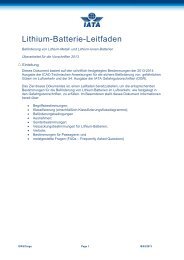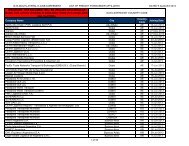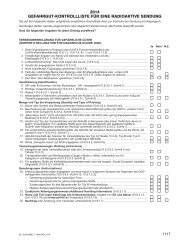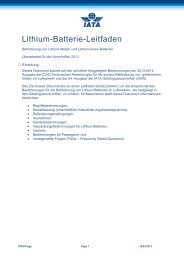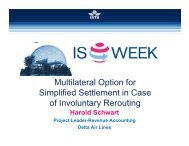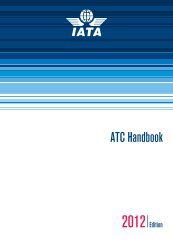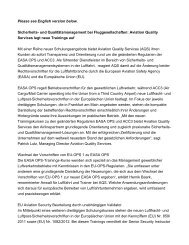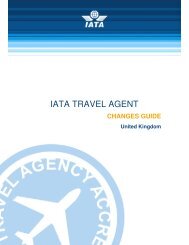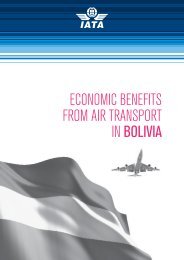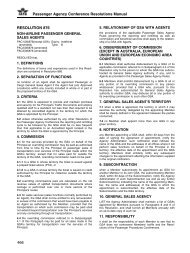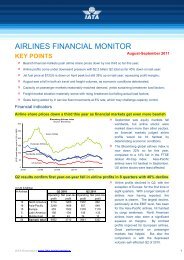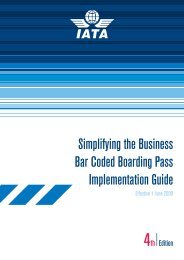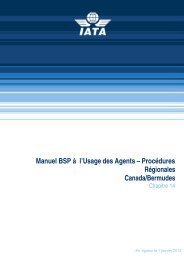Create successful ePaper yourself
Turn your PDF publications into a flip-book with our unique Google optimized e-Paper software.
Sales taxes and the imposition<br />
of a value-added tax<br />
(VAT) on tickets for international<br />
air transport continue<br />
to be of great concern to the<br />
airline industry. The European<br />
Commission’s Green Paper<br />
on the future of VAT raises the<br />
possibility that international air<br />
passenger travel will no longer<br />
be exempt from VAT in the<br />
EU. <strong>IATA</strong> will continue to make<br />
the case for aviation to remain<br />
exempt from any modifications<br />
to intra-EU VAT legislation.<br />
In addition to its campaigns<br />
against national taxes, <strong>IATA</strong> is<br />
proactively opposing broader<br />
taxation initiatives. These<br />
include solidarity taxes, the<br />
least developed country (LDC)<br />
adaptation levy, environmental<br />
and carbon taxes, tourism<br />
taxes, and many other taxes<br />
that single out and penalize the<br />
aviation industry. <strong>IATA</strong> believes<br />
that such discriminatory taxes<br />
are counterproductive.<br />
Although it is accepted that<br />
many governments need to<br />
finance their deficits, targeting<br />
aviation as a revenue source is<br />
a mistake, as it reduces aviation’s<br />
ability to drive economic<br />
growth. (For more on this, see<br />
the feature on the benefits of<br />
aviation on page 14.)<br />
Taxes<br />
UP<br />
$2.7<br />
billion<br />
In UK, India, Austria,<br />
South Africa, Seychelles,<br />
Grenada, and Jamaica.<br />
Taxes<br />
DOWN<br />
$58<br />
million<br />
In Ireland, Bahamas,<br />
Indonesia, and Sri Lanka.<br />
27<br />
If governments regulate in<br />
isolation, they will compromise<br />
the benefits of aviation.<br />
Aviation is a global business<br />
and requires globally<br />
harmonized rules in which to<br />
operate safely and efficiently.<br />
Unfortunately, many of the<br />
standards and regulations laid<br />
down by individual countries<br />
are not consistent with each<br />
other, leading to increased<br />
costs and passenger inconvenience.<br />
Efficiency and the<br />
ability of aviation to increase<br />
its connectivity also suffer as a<br />
result of individual government<br />
policies.<br />
For example, in Latin America<br />
airlines have pursued a successful<br />
business model of<br />
cross-border diversification that<br />
has allowed them to generate<br />
benefits for the business and<br />
for passengers. Airline consolidation<br />
however, has exposed<br />
uncoordinated regulatory structures<br />
that represent barriers to<br />
efficient growth and reflect a<br />
highly fragmented region.<br />
A positive development is a potential<br />
change to the Brazilian<br />
Aeronautical Code under<br />
discussion by the national<br />
congress that seeks to raise<br />
the limit to foreign ownership<br />
of Brazilian airlines from 20%<br />
to 49%. If approved, this will<br />
represent an important step<br />
towards attracting capital and<br />
investment in the region.<br />
Aside from issues around ownership<br />
rules for airlines and the<br />
regulatory framework for airport<br />
charges, two of the most important<br />
areas for harmonization are<br />
passenger rights in the case of<br />
delays or denied boarding and<br />
slot management at airports.<br />
Passenger compensation<br />
rights in the United States<br />
and Europe are an example<br />
of unintended consequences.<br />
Despite airlines operating in<br />
highly competitive markets<br />
where customer care quality<br />
is a major factor in passenger<br />
loyalty, regulatory authorities<br />
continue to legislate on delay<br />
compensation. Many of these<br />
regulations lead to market distortion<br />
and uncertainty for passengers.<br />
In Europe, a number<br />
of legal challenges have begun<br />
to determine the boundaries of<br />
airline responsibility in the case<br />
of denied boarding. And in the<br />
United States there has been<br />
considerable debate over the<br />
new tarmac delay rule, which<br />
some estimates show will cost<br />
the US economy over $30<br />
billion and fail to tackle the underlying<br />
causes of delays. (See<br />
page 29 for more on passenger<br />
rights legislation.)



